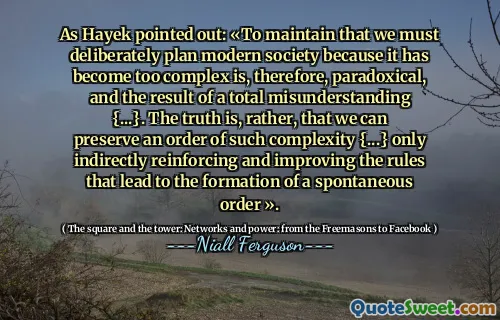In "The Square and the Tower," Niall Ferguson explores the relationship between networks and power throughout history, starting from the era of secret societies like the Freemasons to modern social media platforms like Facebook. He posits that understanding power dynamics involves examining both hierarchical structures and decentralized networks. Ferguson argues that networks can both uplift and undermine established power, creating a complex interplay that has emerged throughout historical events.
The book examines how these network patterns have influenced significant political and social changes over time. Ferguson illustrates how networks have played critical roles during different epochs, such as the rise of the Enlightenment and the spread of revolutionary ideas. He emphasizes that these connections can empower previously marginalized groups, shifting the balance of power and sometimes leading to chaos and instability.
Ferguson's analysis culminates in a discussion of the digital age, where technological connectivity has transformed the way individuals interact, share information, and mobilize for social causes. He raises questions about the implications of current network structures, particularly the role of platforms like Facebook in shaping public opinion and political outcomes. The book ultimately urges readers to reconsider historical and contemporary power structures through the lens of networks, revealing their significance in understanding our modern world.
More »
Today Birthdays
1960 -
Dave Pelzer
1936 -
Mary Tyler Moore
1809 -
Albert Pike
1959 -
Paula Poundstone
1876 -
Pablo Casals
1995 -
Ross Lynch
1809 -
William E. Gladstone
1952 -
Gelsey Kirkland
1974 -
Mekhi Phifer
1972 -
Leonor Varela
1947 -
Ted Danson
1976 -
Danny McBride
1959 -
Patricia Clarkson
1975 -
Sarah Lacy
1972 -
Jude Law
1979 -
Diego Luna
1911 -
Klaus Fuchs
1969 -
Allan McNish
1938 -
Jon Voight
1879 -
Billy Mitchell
1868 -
Roland Allen
1808 -
Andrew Johnson
1977 -
Katherine Moennig
1957 -
Bruce Beutler
